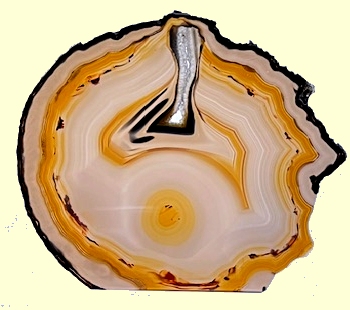
From
smoky to citrine to prase, the color varieties of quartz span the
spectrum. Some of these varietal or market terms such as amethyst are
ancient while others, mango quartz for instance, have been more
recently coined to hype a new find or enhancement.the causes of color
in the macrocrystalline quartz varieties are fairly well-known. Quartz
is largely, but not entirely, made up of Sio2 — silica — which in its
pure form is colorless. as with most minerals, macro-quartz generally
derives color from electronic processes occurring on the atomic level.
the color varieties are largely the result of trace impurities
sometimes involving radiation damage components. though seen less
frequently in minerals, color can also result from the way light
interacts with a mineral’s internal texture (fritsch & rossman
1988). Physical phenomena including interference, diffraction,
scattering, and inclusions sometimes color macro quartz, but they are
exceptions. In agate, however, they are the rule,
